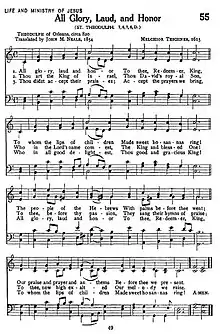All Glory, Laud and Honour
"All Glory, Laud and Honour", is an English translation by the Anglican clergyman John Mason Neale of the Latin hymn "Gloria, laus et honor", which was written by Theodulf of Orléans in 820.[1] It is a Palm Sunday hymn, based on Matthew 21:1–11 and the occasion of Christ's triumphal entry into Jerusalem.[2]
| All Glory, Laud and Honour | |
|---|---|
 | |
| Genre | Hymn |
| Written | 820 |
| Text | John Mason Neale |
| Based on | Matthew 21:1-11 |
| Meter | 7.6.7.6 with refrain |
| Melody | "St. Theodulph" by Melchior Teschner |
History
Theodulf became the Bishop of Orléans under Charlemagne. When Charlemagne died and Louis the Pious became the emperor of the Holy Roman Empire, Theodulf was removed from the bishopric and placed under house arrest at a monastery in Angers during the power struggle following Louis' ascension, mostly due to his opposition to icons and Louis' suspicion that Theodulf supported an Italian rival to the throne.[3] During his arrest, Theodulf wrote "Gloria, laus et honor" for Palm Sunday. Although likely apocryphal, a 16th-century story asserted that Louis heard Theodulf sing "Gloria, laus et honor" one Palm Sunday, and was so inspired that he released Theodulf and ordered that the hymn be sung thereafter on every Palm Sunday.[4][5]
A translation into Middle English was effected by William Herebert: "Wele, herying and worshipe be to Christ that dere ous boughte,/ To wham gradden 'Osanna' children clene of thoughte."
In 1851, John Mason Neale translated the hymn from Latin into English to be published in his Medieval Hymns and Sequences. Neale revised his translation in 1854 and revised it further in 1861 when it was published in the first edition of Hymns Ancient and Modern.[2]
The hymn was originally made of thirty-nine verses however only the first twelve lines were sung since a ninth-century published manuscript attributed to St. Gall until Neale's translation.[2] The original Latin words are used by Roman Catholics alongside the English translation.[6]
Text
Neale's hymn appears as Number 86 in Hymns Ancient & Modern in a version with six stanzas, using the first four lines as the refrain, which is repeated between each stanza. The original Latin stanzas were more numerous, but although they were translated by Neale, many are not sung nowadays, including one which was omitted for "evident reasons", the first two lines reading "Be Thou, O Lord, the Rider,/ And we the little ass;".[7] The hymn's principal theme is praising Christ's triumphal entry into Jerusalem,[8] as evident in the refrain, and it is usually sung for Palm Sunday.[9]
All glory, laud, and honour
To Thee, Redeemer, King!
To Whom the lips of children
Made sweet Hosannas ring,
Thou art the King of Israel
Thou David's Royal Son,
Who in the LORD'S name comest,
The King and Blessèd One.
All glory, &c.
The company of Angels
Is praising Thee on high,
And mortal men, and all things
Created make reply.
All glory, &c.
The people of the Hebrews
With palms before Thee went
Our praise and prayers and anthems
Before Thee we present.
All glory, &c.
To Thee before Thy Passion
They sang their hymns of praise;
To Thee now high exalted
Our melody we raise.
All glory, &c.
Thou didst accept their praises;
Accept the praise we bring,
Who in all good delightest,
Thou good and gracious King.
All glory, &c.[5]
| Wikisource has original text related to this article: |
Tune
The commonly used tune of the hymn, titled "St. Theodulf" or originally "Valet will ich dir geben", was composed in 1603 by Melchior Teschner.[10] The following harmonisation is from Johann Sebastian Bach,[11] as it appears in the New English Hymnal:[12]
In popular culture
In 1967, the hymn was covered by British singer Sir Cliff Richard on his Good News album.[13]
References
- ""All Glory, Laud, and Honor"". Lutheran hymnal. Retrieved 2014-03-14.
- "All Glory, Laud and Honor". Hymnary.org. Retrieved 2014-03-14.
- "In context: All Glory, Laud and Honor". Christian History Institute. Retrieved 2014-04-07.
- Petersen, Randy (2014). Be Still, My Soul: The Inspiring Stories behind 175 of the Most-Loved Hymns. Tyndale House Publishers. p. 13. ISBN 141438842X.
- "Psalter Hymnal (Gray) 375. All Glory, Laud, and Honor". Hymnary. Retrieved 2014-04-07.
- "Hymn: Gloria Laus et Honor (All Glory, Laud and Honor)". Catholic Culture. Retrieved 2014-03-14.
- For a full translation of the most commonly sung latin verses, see John Mason Neale (1867). "Gloria, laus, et honor". Mediæval Hymns and Sequences (3rd ed.). London: Joseph Masters and son. pp. 23–26.
- Nutter, Charles S.; Tillett, Wilbur Fisk (1911). The hymns and hymn writers of the church; an annotated ed. of The Methodist hymnal. New York, Methodist Book Concern. pp. 22, 473.
- Graves, Dan. "All glory, laud, and honor | InContext". Christian History Institute.
- "ST. THEODULPH (Teschner)". Hymnary.org. Retrieved 2014-04-12.
- Originally set to the third stanza of the chorale, in the St. John Passion, per Dahn, Luke. "BWV 245.26". www.bach-chorales.com.
- Bach, Johann Sebastian. "The New English Hymnal 509. All glory, laud and honour". hymnary.org.
- "Cliff Richard: Good News – Overview". AllMusic. Retrieved 2014-04-07.